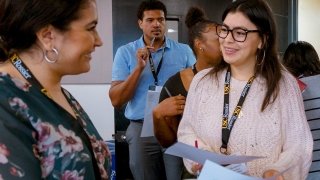Being a doctoral student is an experience like no other.
As the highest level of scholarship within education, you’ll experience academic rigor, have to navigate personal challenges, and maintain exceptional organizational skills.
The upshot is that you emerge from your program with deep knowledge, competitive skills, and a strong professional network.
Earn your doctorate in education.
Recently, USC Rossier students Katie Johns, D’Andre Coats and Ava Jacobs discussed their experiences earning their EdD in the Doctor of Education in Educational Leadership (EDL) program.
Aireale Rodgers, a student in the Doctor of Philosophy in Urban Education Policy (PhD) program also shared her experience pursuing a PhD.
(Wondering about the differences between doctoral degrees? Check out our PhD vs. EdD comparison blog post.)
Here’s what they said about life as a doctoral student.
A doctoral program has professional perks
A doctoral degree certifies you as an authority in your profession, and can benefit you even before you graduate. The EDL students have received job offers based on their enrollment in the program, and become a trusted resource for questions at work.
One of the reasons that Rodgers enrolled in a PhD program was to reinforce her professional credibility. While she seeks the degree out of passion for her work and to achieve career goals, she acknowledges that as a Black woman working in historically white institutions, the credentials will make her ideas about education policy more “legible to people in power,” she says.
Prepare for personal challenges—and personal growth
Increasingly, PhD and EdD programs in education are rooted in issues of equity. As a doctoral student, you’ll be asked to investigate topics related to race and systems, and what role you play in those systems.
Self-reflection and challenging conversations with your cohort are not uncommon. You may need to question some of your beliefs and ‘unlearn’ what you previously thought about topics such as racial equity and gender equity.
However, the doctoral student experience can be transformative. By navigating tough issues, you’re able to broaden your worldview, and acquire tools to make positive change through your work.
Your cohort will become your new family
An academic cohort is the group of students with whom you take all of your required courses.
A cohort is a major part of graduate school. You share a unique and intense academic and personal experience that few other people will fully understand.
Great cohorts also provide a strong support network. The PhD program has student-of-color collectives that offer assistive programming, such as writing support. They also hold social events within and between collectives, as well as across cohorts.
Once you graduate, your cohort can become a resource for professional support as well. (USC Rossier students also benefit from being part of the Trojan Family Network.)
Organization is a must
All of the students who offered input for this piece agree that diligent organization is essential to keeping up with their studies.
Here are some of the tools that doctoral students use to stay organized:
- iCalendar
- Sticky notes
- Whiteboard
- Virtual and hard copies of books
- File folders for individual classes
- Spreadsheets for assigned articles documenting title, name, and ideas (this makes writing papers much easier)
- Google Drive folders to organize articles
- Mendeley (a research and writing organization tool)
- Zotero and Paper Pile (reference managers)
- One Note (note-taking app)
Make time for self-care
Free time will be scarce once you become a doctoral student, so remember to take care of yourself. Whether that means getting enough sleep, or continuing to do select things you enjoy with your family and friends, self-care will keep you centered. Bonus tip: If you’re especially pinched for time, find a low-key activity where you can take reading material for class.
Prepare for the transition back to school
If you’ve been out of school for a while, expect a transition period as you enter your doctoral program. In particular, working professionals will need to figure out how to balance school and employment.
However, while your schedule will be tough, it’s not an insurmountable challenge. Johns said she had a child and moved despite juggling school and a full-time job. PhD students have also started families and pursued passion projects.
If your PhD program is fully funded, prepare for a different kind of transition. “It’s an extreme pleasure to be paid to think,” said Rodgers. But one of the challenges as a PhD student in education is to figure out how to translate theories about equity and justice to the classroom.
Accept that you won’t always have the answers
The material in your courses will challenge you. It’s important then to set expectations early, especially if you’re an exceptional student or perfectionist who feels uncomfortable with uncertainty. By learning to cope with the academic rigor, you’ll have an easier experience in your program.
(Temporary) imposter syndrome is not uncommon
You will be surrounded by first-rate students and professors with impressive credentials. The experience can leave some doctoral students feeling like they’re unworthy of the program. But thanks to a supportive cohort, the feeling does subside.
It’s also helpful to remember that you and your cohort are working together to serve a greater purpose. By committing yourself to the collective, transformative power of your work, you stay grounded and confident.
The work is intense
As you might expect, doctoral students are held to exceptional academic standards. Every program is different, but expect a demanding schedule of reading and writing.
However, remember that you will probably find value in your work, no matter how intense. “Even on my hardest days, I couldn’t imagine doing anything else,” said Rodgers.
Your dissertation is a valuable opportunity
Typically, doctoral students are required to complete a dissertation to earn their degree. The project is an opportunity to tackle a complex problem in your field, and strengthen your authority on the topic.
Rodgers, whose career goal is to become a tenured professor, is using her dissertation to study “how ideas about racial meaning are explored, contested, and even reimagined in university classrooms.”
While the process is intensive, your dissertation group, which includes your advisor and fellow classmates, become a backbone of support. “Their rich experiences, valuable perspectives, and funds of knowledge … make the journey easier to navigate,” said Jacobs.
Doctoral student vs. doctoral candidate: What’s the difference?
A doctoral student is someone who is enrolled in doctoral coursework and working towards their degree. A doctoral candidate, on the other hand, has completed all course requirements and exams, but has not yet finished their dissertation.
Final tips for doctoral students
If your doctoral program isn’t fully funded, explore options for paying for grad school. USC Rossier also offers information on scholarships and other ways to finance your study.
For aspiring PhD students of color, the PhD Preparation Summit may be a good resource. Co-created by Rodgers and PhD candidate, Ashley Stewart, the summit is designed to help you prepare your application for PhD programs in education, and connect with other doctoral students and faculty.




